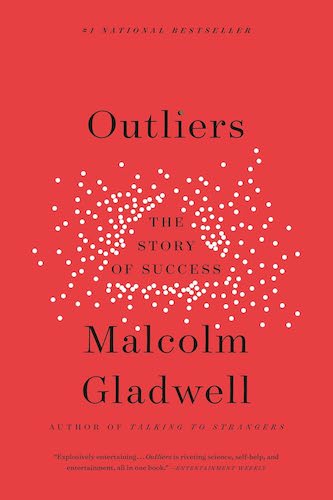Outliers
Book Author: Malcom Gladwell
Summary reviewed by:
Terrence Timmons
Terrence Timmons
Analyst
Bachelor of Arts (BA), University Of California, Santa Barbara 2019
With over 4 years of experience as an analyst. Terrence Timmons is committed to analyzing summaries without compromising on quality.
Outliers: Summary
What if success isn't just about hard work and talent, but also about hidden advantages beyond your control?
In "Outliers," Malcolm Gladwell unveils the intriguing thesis that extraordinary achievements are less about individual effort and more about a confluence of external factors—culture, timing, and opportunity. Backed by sociological and psychological research, Gladwell challenges the notion that personal merit alone propels people to the pinnacle of success.
The book delves into studies like the "10,000-Hour Rule," which suggests that mastering a skill requires a significant time investment. Gladwell illustrates this with examples from various fields, such as The Beatles' extensive performance hours in Hamburg before fame and Bill Gates' early access to computers. By analyzing patterns in success stories, he reveals how factors like birthdates, cultural legacies, and societal structures play pivotal roles.
As a renowned journalist and author, Gladwell brings credibility through his meticulous research and storytelling prowess. His background in reporting complex ideas in accessible ways allows him to weave compelling narratives that shed light on the unseen forces influencing success.
The book encourages readers to reassess personal development by understanding the importance of seizing opportunities and recognizing the impact of their environment. While it doesn't offer step-by-step strategies, it emphasizes that being aware of these external factors can help individuals navigate their paths more effectively. For instance, acknowledging the significance of cultural heritage can inform one's approach to problem-solving and collaboration.
Though not a traditional self-help guide, "Outliers" implicitly suggests that dedication and practice are crucial—highlighted by the 10,000-hour principle. By showcasing how successful individuals accumulated hours of practice, it motivates readers to commit time and effort to their pursuits. The book also prompts readers to consider how they can create or seek out opportunities that align with their goals.
In essence, Gladwell's work provides a thought-provoking lens through which to view success, urging readers to look beyond personal attributes and consider the broader context that enables high achievement.
Moreover, Gladwell unravels the importance of meaningful work and practical intelligence. He contrasts two brilliant men - Chris Langan, who despite an astronomical IQ failed to achieve wide-scale success, and Robert Oppenheimer, the father of the atomic bomb, arguing that their differing outcomes were significantly shaped by their varying circumstances and application of practical intelligence.
"Outliers" invites you on an explorative journey, scrutinizing the hidden factors that propel certain individuals to unparalleled heights of success.
Outliers: Genres
Non-fiction
Social Science
Psychology
Business & Economics
Outliers: Main Characters
Christopher Langan: An American with an exceptionally high IQ, Langan embodies untapped potential hindered by lack of opportunity and social capital. His story underscores that intelligence alone doesn’t guarantee success without supportive environments.
Bill Gates: Co-founder of Microsoft, Gates illustrates how unique opportunities, such as early access to computers, coupled with perseverance, can lead to remarkable achievements. His journey highlights the significance of seizing the right moments.
The Beatles: The iconic British band exemplifies the power of relentless practice and dedication. Their extensive hours performing in Hamburg sharpened their skills, paving the way for their global success.
Joe Flom: A distinguished lawyer from humble beginnings, Flom’s rise demonstrates how demographic factors and being part of a marginalized group during specific times can create unique professional opportunities.
Outliers: Themes
The Impact of Opportunity and Timing: Success is deeply influenced by external factors like birth date and historical context. Bill Gates’ early exposure to computers positioned him advantageously in the burgeoning tech industry.
The 10,000-Hour Principle: Mastery requires approximately 10,000 hours of dedicated practice. The Beatles’ relentless performances in Hamburg allowed them to refine their craft extensively.
Cultural Legacy’s Role: Cultural backgrounds shape behaviors and problem-solving approaches that affect success. The book discusses how cultural communication styles influenced the performance of Korean airline pilots.
Socioeconomic Influences: Family environment and social standing significantly affect access to opportunities. Christopher Langan’s lack of support and resources impeded his ability to capitalize on his intelligence.
Accumulated Advantages: Small, early advantages can compound over time, leading to significant disparities in success. The prevalence of Canadian hockey players born early in the year results from age-based selection processes favoring older youths.
Outliers: Methodology
In capturing the essence of "Outliers," we utilized expert analysis to explore how opportunity and cultural legacy influence success, echoing Gladwell’s insights on figures like Bill Gates and The Beatles. By synthesizing content, we distilled core themes such as the 10,000-hour principle and accumulated advantages, ensuring each element aligned seamlessly with the book’s central arguments. Committed to quality and integrity, our summary faithfully reflects Gladwell’s nuanced perspectives, providing readers with a clear and engaging overview that highlights the intricate dynamics driving extraordinary achievement.


Outliers
Date Published: November 18, 2008
Disclaimer: As an Amazon Associate I earn from qualifying purchases.




